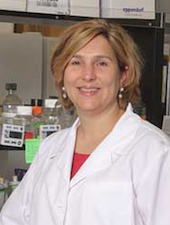Sarah Hamm-Alvarez To Lead SC CTSI Research Development
SC CTSI awards over $1 million annually to advance research, infrastructure, and career development in clinical and translational science.
Sarah Hamm-Alvarez, PhD, chair of Pharmacology and Pharmaceutical Sciences at the Keck School of Medicine at USC, has joined the SC CTSI as Director of Research and Development. She assumes responsibility for fostering establishment and development of interdisciplinary clinical and translational teams, projects and programs.

A groundbreaking diagnostic tool for the autoimmune disease, Sjögren’s syndrome, has been developed at the USC School of Pharmacy, and now with funding from the USC Stevens Institute for Innovation, it will enter the clinical study needed to take it to market.
Sarah Hamm-Alvarez, chair of the Department of Pharmacology and Pharmaceutical Sciences and associate dean for research affairs at the School of Pharmacy, has developed a novel tear-based diagnostic tool for Sjögren’s syndrome, which occurs when the immune system attacks the moisture-producing glands in the body. Four million Americans are affected by this chronic autoimmune disease, and when left untreated it can lead to a range of complications, some of which are life-threatening.
Because dry-eye is a symptom of the disease, Sjögren’s syndrome is often misdiagnosed as chronic dry-eye, and is even sometimes mistaken for depression. There are currently no simple tests for early identification, so consequently the average time for a Sjögren’s syndrome diagnosis is almost seven years, opening the door for added complications and risks.
Currently, there are two blood markers being used to test for the disease, neither offering a conclusive result. In preliminary studies, the test developed by Hamm-Alvarez does provide a conclusive result.
“The test we’ve developed provides a low-cost diagnostic tool that has the potential to increase early identification of Sjögren’s syndrome patients,” says Hamm-Alvarez who holds the Gavin S. Herbert Chair in Pharmaceutical Sciences. “We’ve discovered an enzyme that is enriched in the tears when examined in our lab disease models. Further, we’ve analyzed results on 180 randomized patients, also providing preliminary but positive clinical data.”
Of further interest, the assay can easily be added to the current diagnostic tool kit used by ophthalmologists and optometrists, making it a low-cost, accessible way to test patients for Sjögren’s syndrome when patients present with dry eye symptoms.
Working with Annette Kleiser of the Stevens Institute, Hamm-Alvarez has already found great interest in the tool by industry. However, additional clinical data from focused populations has been requested prior to moving to next steps on the project.
The Stevens Institute for Innovation, a university-wide resource that spearhead tech transfer between USC professors and venture capitalists and industry, has identified the Hamm-Alvarez project as a breakthrough innovation that has high potential and will provide financial support to conduct this larger-scale clinical trial through their Ideas Empowered Program.
Hamm-Alvarez, along with co-investigators John Irvine of the USC Keck School of Medicine and Doheny Eye Institute and William Stohl, chief of the Division of Rheumatology at the Keck School of Medicine, will test this novel diagnostic tool on 350 female patients over the course of eight months. The clinical study will also be conducted with J. Martin Heur, Doheny Eye Institute and Daniel Arkfeld, Keck School of Medicine. Wendy Mack, also of the Keck School of Medicine, will provide statistical guidance on the clinical trial through the CTSI statistical core.
The translational trial is the next step in moving the Hamm-Alvarez invention into a marketable product that can be used to by ophthalmologists and optometrists to simply and affectively diagnose a potentially dangerous disease.
“This is an exciting next step for us,” says Hamm-Alvarez. “It promises early diagnosis of Sjögren’s disease and early diagnosis promises better health outcomes.”
The original article was published on the USC School of Pharmacy website
Learn more about SC CTSI research funding



